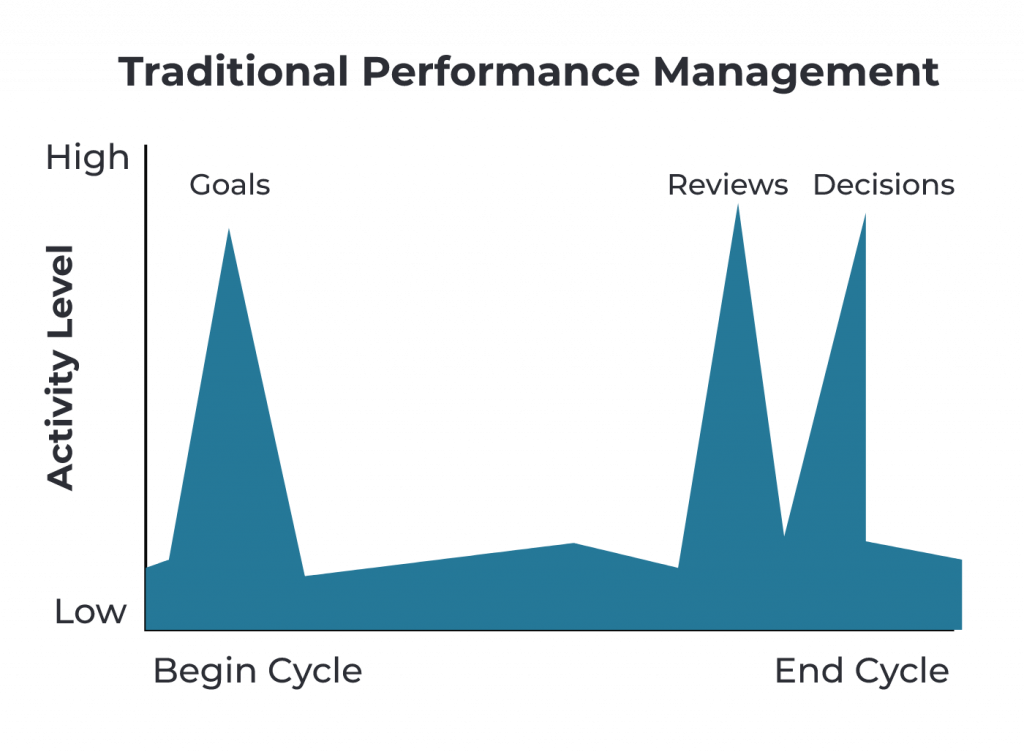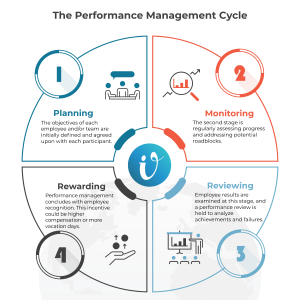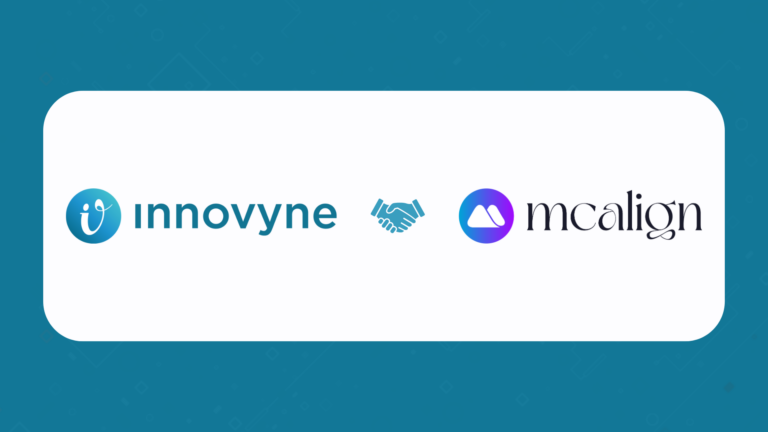How companies manage the performance of its employees?
Until recently, the majority of businesses used an annual review system to keep track of the performance of their employees. In this traditional performance management process, employees would be assigned tasks to complete at the start of the fiscal year, and then they would be reviewed at the end of the year to see how they performed. Below is a graphical representation of what it used to be like.

The traditional performance management process lacked engagement between the managers and their teams which is required for productivity, loyalty, and ultimately more profit and sales.
However, in recent times, performance management has become a continuous process rather than a rigid one due to the ever-changing economic conditions and employee demands. Managers continuously monitor real-time insights and their team’s performance and take decisive actions. Performance management is now a four-step process that involves the following :
The employee performance management cycle

Planning: The planning phase is all about setting expectations for your employees and a deadline to finish their tasks in a specific timeframe. Employees and managers have to make sure that the goals are realistic and achievable within the given timeframe.
Monitoring: Unlike the traditional annual performance review system, monitoring in the current employee performance management process involves daily, weekly, or monthly evaluations of the employees. Managers assess their employees’ performance using data-driven insights provided by performance management solutions.
Reviewing: It is in this phase that managers provide feedback based on the performance of the employees. If there is room for improvement, managers should show an expectation of better performance. Performance management solutions can be excellent tools for managers to identify the strengths and weaknesses of their employees, provide insights into the overall performance of the team, and offer suggestions for improvement.
Rewarding: Rewarding is the last stage of the performance management cycle. It is a complicated process that requires a lot of time, effort, and resources.
It should not only be designed in a way that motivates the employees to perform better and stay motivated, but also should align with the company’s values and objectives. Rewards can be classified into two broad categories: intrinsic and extrinsic rewards. Intrinsic rewards are those which are not tangible or financial in nature, such as praise, recognition, and respect. Extrinsic rewards are those which are tangible or financial in nature, such as performance appraisal, promotion, stock options, etc.
Why is performance management important?
As mentioned earlier, performance management is important because it helps managers give feedback on how well employees are performing in their current position during the performance review process. It also acts as a way to measure employee growth and development over time, which helps them identify areas for improvement and set performance goals.
Following are the other benefits of performance management :
1. Performance reports
Performance reports are an important part of performance management. It is generated to provide employees with timely feedback on how they are doing and what they can do to improve. Managers should use performance reports as an opportunity to provide constructive criticism and advice. Performance management solutions include a variety of performance reports that provide a clear picture of each employee’s performance. For example, if you use goals to track employee performance, goal reports will show you how they are progressing.
2. Review process
Performance management helps employees to review their performance in a systematic manner. Performance management software with a self-service portal will especially help you smoothen the whole review process. Employees can log in to the portal and look into their key performance indicators and see where they stand in terms of their performance.
3. The clarity in the business
Many employees are confused about their responsibilities, expectations, and whom they should report. The company may make all of this very clear through performance management. Inadequate knowledge frequently leads to inactivity. As a result, by providing clarity for staff, the end effect will usually be increased productivity and confidence.
4. Opportunity for exchanging feedback
Poor communication is a cause for concern in a business setting, especially in collaboration. Management frequently speaks with employees about their performance, but workers seldom have the opportunity to voice concerns or issues. Performance management enhances results by promoting an opportunity for both the employer and employee to provide Feedback. When employees can voice their ideas, they frequently feel more valued.
5. Employee Retention
Managers are also encouraged to reward and acknowledge their workers through performance management. Some employees leave their jobs because they don’t get acknowledged. Employees want to be recognized for their efforts. In addition to clarity, feedback sharing, and further training when required, rewards and appreciation can help employees stay with a company.
6. Boosts employee engagement
Employee engagement will improve when the emphasis is on performance management. When there is no connection between management and staff, it’s as though they’re just going through the motions of their day. Their job becomes only a position to them rather than a worthwhile vocation.
On the other hand, performance management has the potential to engage employees fully and make them feel involved in their employer. This encourages job satisfaction and employee loyalty, leading to increased production.
7. Employees’ recognition
Businesses frequently overlook the significance of recognizing and rewarding their personnel. It may have a significant detrimental impact on your Business.
Recognition and remuneration can only be effective in organizations where there is a clear and trustworthy process for discussions and performance evaluations. Through continuous performance management, the management may find efforts and activities deserving of encouragement and reward. As a result, your team members will have a development mindset.
The engagement level of employees can rise by up to 55% in companies that implement meaningful appraisal systems.
8. Boosts productivity
Product management or business processes are often developed with data-driven methodologies, and performance metrics and optimization should be accurate, relevant, timely, accessible to all stakeholders, actionable, and reliable. This format requires a lot of information that must be thoroughly investigated before any decisions are made.
9. Enforce goals achievement
A strong performance management process allows workers to grasp the company’s objectives and what they are supposed to accomplish to meet them. This means they realize how their efforts influence the company’s growth. Management of performance will assist with setting business and executive objectives. Setting visible priorities and direction by aligning the whole of your teams with greater corporate goals establishes apparent targets and meaning, ensuring that people have a feeling of ownership in the company through personal goals.
10. Mentoring for increasing performance
The ultimate goal of performance management is to increase performance. It will allow managers to develop strategies for increasing performance while also allowing employees to discuss their career prospects and goals.
Overall, it will assist the senior executive manager and HR manager in offering more mentoring and training that may be used in establishing promotion criteria.
11. Good for overall business evaluation
All of the benefits of performance management add to improved company performance as a whole. Employees that are flourishing will provide better work and be more motivated to experiment and advance.
This highlights the need for good performance management and its value for your entire business if done correctly. On the other hand, it also identifies the potential risks your business can overcome as early.
What is a performance management system?
A performance management system is a software that helps companies to manage and measure the performance of their employees on a centralized platform. They offer a variety of features such as automated reports, analytics, and data-driven insights using which managers can run consistent performance appraisals and make sure the performance of their teams aligns with the objectives of a company. The system also gives a bird’s eye view of the performance management process for the administrators to oversee the entire process and make necessary changes to it.
Why are performance management systems important?
Making human capital management decisions in this day and age is difficult due to increased labor productivity, strong employee engagement, constant performance tracking, and other factors. This problem can be solved with performance management solutions that use cloud computing, have an appealing user interface, and are AI-enabled.
A performance management system is important because it provides an accurate and real-time view of the workforce that is needed to run a continuous performance management cycle.
Types of performance management
Sales Performance Management
Sales performance management (SPM) is a strategy for increasing individual and team selling effectiveness across an organization by analyzing data from surveys, reports, and other sources.
It is significant because it allows organizations to better understand what works best in hiring practices, training methods, and company culture in order to achieve better results for both employees and customers.
A sales performance management solutions track the performance of the sales team. It helps them to set up objectives and development plans for employees.
The solution provides insights into the current performance of the team, their latest goals, and what they need to do in order to improve. It also provides information on how much time each employee spends on a given task, how often they make contact with customers, etc.
Related: What is Sales Performance Management?
Enterprise Performance Management
EPM software, or enterprise performance management software, specializes in budgeting, forecasting, and financial management. It offers data analytics, reporting, and forecast modeling so that businesses can analyze, comprehend, and plan strategically.
Companies can use EPM solutions to align business strategy with business execution. The technology incorporates feedback derived from data generated by tools, processes, and activities throughout the organization.
The resulting analytics aid in the identification of business drivers and other insights. Companies can assess new opportunities, increase profitability in existing businesses, and respond more quickly to unexpected change and disruption.
Enterprise performance management software informs future decisions, drives efficiencies, and improves the company’s financial and operational performance.
Conclusion
Performance management is important to any business because it allows for the timely identification and correction of problems and the optimization of employee productivity.
Ongoing performance reviews also provide a basis for employees to receive feedback and coaching from their supervisors, which can help improve individual and organizational performance. When used effectively, performance management solutions can be invaluable for businesses.
If you haven’t already put a performance management solutions in your organization, now may be the time to do so.



